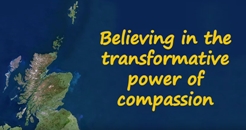 Story of a trauma-informed school
Story of a trauma-informed school
From a video by ACE-Aware Scotland
Susanne McCafferty, Headteacher of Bainsford Primary School in Falkirk was recently interviewed about the way knowledge of Adverse Childhood Experiences has changed lives and professional practice in her school. Here are some excerpts:
When I was a young teacher, people would talk about that children in areas of poverty don't attain and I thought,
"Why not? Why is that?". It can't be just because they are poor because I didn't come from an affluent family and yet we all went to college or university so I knew there had to be another reason why children were not attaining.
Fortunately I came across the work of Nadine Burke Harris about children with Adverse Childhood Experiences (ACEs). I thought that is definitely what I'm seeing - children who are coming into school who are already in a state of anxiety and they do not need me or anyone else adding to the anxiety that they've got. What they need from us is someone to listen to them, to help regulate themselves and to look at what's happening in their lives. We should tell the children that we are there for them and that we want to help them as much as we can.
Based on the work of Paul Dix, we took down the behaviour charts, the points charts, stopped using green good, amber warning and red consequence cards. We put up instead a recognition board where there is a target for the children to work towards and that might be a target of everyone is listening well and if the teacher sees them listening well they get their name up for the good reasons.
The staff were really up for it as they realized as well that we were not doing these children really any justice. We took it to the Parent Council and and explained to them what we were doing and why we were doing it and they just thought it was absolutely wonderful. They thought it was amazing. They weren't frightened that behaviour was going to worsen but what it did gave parents was an awareness of that, when we are dealing with a child that would maybe have been seen before as being a naughty child, that there are other reasons for the behaviours that were seeing. So the way that we deal with those behaviours is completely different now. We're not punishing children because they are behaving really badly, we're trying to understand what has happened to them.
Our behaviour policy was so out of touch with how the school has moved on. Our new policy has involved parents and chidren and what we have is a collaborative relationship and policy - I don't even think we call a policy.
When I was a teacher and moved into an area of significant deprivation, I was completely unaware of where the children were coming from and nobody told me what home life was like for these children. I was giving a boy a hard time for having no homework jotter and I said to him, "You
must have a homework jotter. It must be in your house. You just go home and find it. You must be able to find it." Thinking stupidly, naively that his house will be like my house. The head teacher at that school said to me. "I want you to come with me.". She took me to the boy's house and the mum welcomed us in and I couldn't find a bed in the house, never mind a homework jotter. I was giving a new boy grief for a homework jotter when he's not even got anywhere to sleep. That was such a hard hitting time for me and that I realized then we have to start treating children that are coming from chaotic households so differently.
We need to go back and look at the teachers who are coming out of university - what do they know about adverse childhood experiences? What do they know about children who have experienced any kind of trauma or live in deep poverty and coming into school with only the clothes on their backs, having had no breakfast and maybe no dinner?
Commenting the impact we've seen, if you'd have asked me this time last year about some of the destinations for some of our children I would have probably said they're not going to be good. However a year down the line of being a trauma-informed school, knowing about adverse childhood experiences and the work that we've done following the Paul Dix work, I can now, hand on my heart, see that the children that will be soon leaving our school are going to have very positive destinations because they are able to regulate themselves much better because they have had that modelled to them by staff who are able to regulate their own behaviours.
The interview contains many other insights and can be seen here.
Retweet about this article:
From a video by ACE-Aware Scotland, 17/07/2019